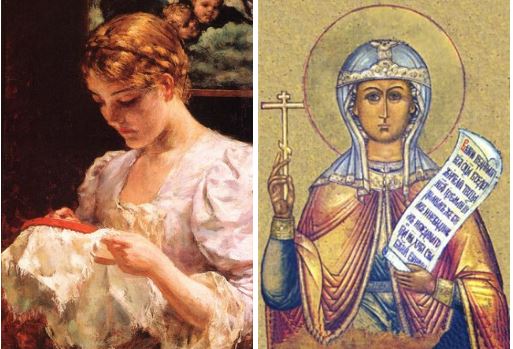Dear needlewomen !!! I sincerely congratulate you on the Day of the Embroiderer !!!!!
Let the needle dance
Together with the thread on the canvas,
Waltz crosses draw
Again, these two girlfriends.
Let the sea go,
And there are five processes,
Let the hamster walk plenty
If only not to lose time!
So that problems and concerns,
Like clouds, swept,
To new work
All were born for the joy!
November 10 - the day of embroiderers and patroness of all needlewomen Paraskeva Friday
On November 10 (October 28, old style), our ancestors celebrated the commemoration of the holy martyr Paraskeva Friday. According to legend, the holy martyr Paraskeva was born in a rich and pious family; her parents especially honored the day of the Lord’s sufferings — Friday, which is why they called their daughter, born on this day, Paraskeva, which in Greek means Friday.
Honoring St. Paraskeva, Christian women did not spin on Friday (although in some places they were allowed to sew), they did not cook liquor, did not wash clothes, did not take out ash from the furnace, and men these days did not plow or harrow, considering that big sin This was reflected in the popular saying: "On Fridays, men do not plow, women do not spin."
The holy martyr Paraskeva from ancient times enjoyed special love and reverence among the Orthodox Russian people; With the day of her memory in the Slavic tradition was associated with many very different beliefs, customs, beliefs and rituals. Icons of Holy Friday in the old days could be found in almost every house: it was believed that its icons protect family well-being and happiness.
Saint Paraskeva was almost everywhere revered as a woman’s saint, patroness of women, as well as marriage and family happiness. Peasant women considered her to be their intercessor and protector, and the girls prayed for her to get married as soon as possible and for good suitors.
As a woman's saint, Friday was also considered the patroness of all women's work, especially winter work, first of all, spinning, weaving, as well as works generally associated with flax. About the day of Paraskeva Fridays, women in many places began to crumple and flap flax. Because of this, the people of the martyr Paraskeva have often been called Flaxen.
At the same time, in many provinces there was a custom on the day of the memory of Saint Paraskeva to bring to the church the frayed first piece of flax, which was dedicated to the saint, and then hung on to her image. On the same day, the so-called “linen watches” were organized: the women carried out the shabby flax pervak into the street and demonstrated to each other. The girls tried to show their work to boys and future mother-in-law.
Probably, the veneration of St. Paraskeva as the patroness of works related to flax and yarn was connected, in some places in the Russian North, that if there was a knock at Paraskeva in Indian kuta, he should be talked about gently, bypassing the tow or with yarn all the corners of the house. In Ukraine, the ceremony of sacrificing Paraskeva Friday for towing or yarn was known: the objects of women's handicraft were thrown into the well, believing that in this way the sacrifice would reach the saint.

